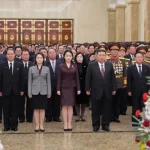
When the acting head of the Secret Service appeared on Capitol Hill this week, one of the major headlines was that he was “ashamed.”
Ronald Rowe told a joint hearing of the Senate Judiciary and Homeland Security committees that after visiting the site of the July 13 attempted assassination of Donald Trump, he was “ashamed” that the roof the sniper had fired from had not been guarded, according to The New York Times.
But according to a whistleblower communicating with Republican Sen. Josh Hawley’s office, Rowe himself helped create the conditions that made the disgraceful event possible — and Hawley has given Rowe until next week to prove otherwise.
As Fox News reported, Hawley says the whistleblower claims that Rowe himself is responsible for the lack of manpower that made the Trump assassination attempt possible.
And if that’s true, it means the resignation of disgraced former Secret Service Director Kimberly Cheatle hasn’t changed the kind of ineptitude at the top that has blackened the once-stellar reputation of the agency entrusted to protect the nation’s presidents — and presidential candidates.
Trending:
In a letter to Rowe on Thursday, Hawley wrote that the whistleblower claims that Rowe, as deputy director of the Secret Service under Cheatle, was behind cuts to the agency’s Counter Surveillance Division — and that those cuts were responsible for the shocking lack of security surrounding Trump’s July rally in Butler, Pennsylvania.
The division “performs threat assessment of event sites before the event occurs” Hawley wrote, but “did not perform its typical evaluation of the Butler site and was not present on the day.” (Emphasis in the original.)
“The whistleblower further alleges that you personally directed significant cuts to CSD, up to and including reducing the division’s manpower by twenty percent,” Hawley wrote.
Then he included this tart sentence: “You did not mention this in your Senate testimony when asked directly to explain manpower reductions.”
Was Rowe the right person to replace Cheatle?
Yes: 0% (0 Votes)
No: 0% (0 Votes)
It’s important to point out there’s apparently no love lost between Hawley and Rowe. The exchange between the men at Tuesday’s hearing became a shouting match as Hawley demanded that someone be held responsible for the Secret Service failure in Butler, and Rowe maintained the agency needed time to investigate.
Check it out here:
Josh Hawley and Acting Secret Service Director Ronald L. Rowe Jr. get into a shouting match during Senate hearing on Trump assassination attempt.
“Unfairly persecuted?! We’ve got people who are dead!” https://t.co/G1aLfe9UOz pic.twitter.com/NqvacYRRWS
— Zachary Leeman (@WritingLeeman) July 30, 2024
At a news conference on Friday, Rowe was asked about the allegations in Hawley’s letter and said his agency would respond to the letter.
“I know that there’s been allegations that I personally cut or that I — let’s say, that I denied requests,” he said, according to a CNN transcript.
“The Counter Surveillance Division has been out there supporting the former president’s detail at some very high-profile events. They continue to provide that support. And they are out there providing support right now.
“So we’re going to respond to the letter that we received. And we’ll be sure to make that — I’m sure they will — we’ll be able to share that response when the committee says it’s OK to respond.”
If Rowe means what he said, the clock is ticking. Hawley’s letter gave him a deadline of Aug. 8 — a week from the day the letter was sent — to provide records about CSD staffing as well as Rowe’s “personal involvement” in those decisions.
Since Hawley’s letter states that the whistleblower alleges the Secret Service had retaliated against agents who complained about security issues surrounding Trump events, the letter also demands “The number of Secret Service agents who have raised concerns about security practices within the Secret Service and are currently facing disciplinary action, as well as the nature of the concerns and the type of disciplinary action.”
Finally, it seeks “a breakdown of Secret Service personnel at the July 13 rally by division or unit.”
In other words, the numbers will tell the story. And Rowe’s personal responsibility for those numbers should be clear.
Is the whistleblower correct? Is he or she in a position to know how Secret Service personnel decisions are made and reporting that knowledge accurately? (God knows, Trump supporters learned years ago — thanks to Democratic liars like Adam Schiff — that the term “whistleblower” can just as easily describe a politically motivated hatchet man as it can a noble source of solid information.)
As it stands, the American people still don’t have a full story about the cascade of security failures that led to Trump being shot in the ear — centimeters from death — led to the death of a Trump supporter, and the critical wounding of two others.
And the country still doesn’t know how deeply the Secret Service might be infected with the rot of political polarization, and consequent incompetence, that has become the hallmark of certain arms of the federal government — the Justice Department and the FBI in particular — since the presidency of Barack Obama.
And it doesn’t know if exchanging Kimberley Cheatle at the top of the Secret Service for another agency career official like Ronald Rowe has changed things for the better. Or if things have actually gotten worse.
The reality is that instead of the picture becoming clearer since July 13, when a 20-year-old almost managed to kill the 45th and potentially 47th president of the United States, it just keeps getting cloudier.
The Secret Service — and the man who’s not in charge of it — could have a whole lot more than the events of July 13 to be ashamed of.







